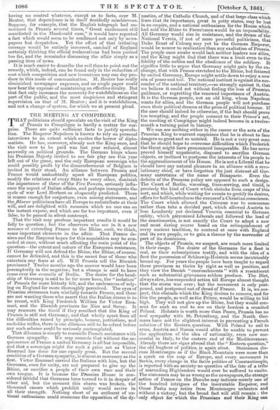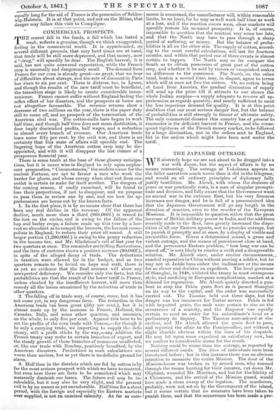THE MEETING AT COMPIEGNE. T HAT politicians should speculate on the
visit of the King of Prussia to Compiegne is hardly a matter for sur- prise. There are quite sufficient facts to justify specula- tion. The Emperor Napoleon is known to rely on personal interviews to an extent which excites the horror of diplo- matists. He has, moreover, already met the King once, and the visit now to be paid was last year refused, almost avowedly on political grounds. The German kings whom his Prussian Majesty invited to see fair play are this year left out of the game, and the only European sovereign who could possibly profit by the dismemberment of Belgium is invited in their stead. An alliance between Prussia and France would undoubtedly upset all European politics, modify the relations of every State to every other, diminish the importance of three of the Five Powers, seriously influ- ence the aspect of Italian affairs, and perhaps inaugurate the cycle of war Lord Herbert so eloquently predicted. There is reason enough for conjecture, even among statesmen, and the jidneur politicians have all Europe to redistribute at their will, and are delighted with rumours which no one can on the instant expose, and which are far too important, even if false, to be passed in silent contempt. That the visit may produce important results it would be folly to question ; but the observers who see in it a new menace of extending France to the Rhine, omit, we think, some important elements in the affair. That France de- sires and the Emperor hopes for this acquisition may be con- ceded at once, without much affecting the main point of the question—the extent and nature of the European resistance, If Germany will not defend the Rhine, the Rhine, of course. cannot be defended, and this is the secret fear of those who entertain any fears at all. Will Prussia sell the Rhenish provinces ? Twelve months ago the answer would have been peremptorily in the negative; but a change is said to have come over the councils of Berlin. The desire for the head- ship of Germany is said to be far more keen, the "isolation" of Prussia far more bitterly felt, and the uselessness of rely- ing on England far more thoroughly perceived. The eyes of Prussian statesmen turn wistfully towards France, and there are not wanting those who assert that the Italian drama is to be recast, with King Frederick William for Victor Ema- nuel, and the Rhenish provinces for Nice and Savoy. It may reassure the timid if they recollect that the King of Prussia is still not Germany, and that wholly apart from all the difficulties raised by principle, honour, patriotism, and such-like trifles, there is one dilemma still to be solved before any such scheme could be seriously contemplated. That dilemma is simply to reconcile French assistance with German sympathy. We may concede that without the ac- quiescence of France a united Germany is all but impossible, and that a sovereign might for such a prize act as Victor Emanuel has done for one equally great. But the second condition of a German sympathy, is almost as necessary as the first. Victor Emanuel carried the Italians with him, but the Germans, even for unity, are not prepared to give up the Rhine, or sacrifice a people of their own race and their own tongue. It is because the Prussian House is con- sidered faithful that Germans hairs, turned to it in despair of other aid, but the moment this charm was broken, the thousand causes which prohibit unity would revive in all their strength. Nothing short of an outburst of na- tional enthusiasm could overcome the opposition of the dy- nasties, of the Catholic Church, and of that large class which fears that its importance, great in petty states, may be lost in an empire, and a national enthusiasm for the House which had sold the Rhine to Frenchmen would be an impossibility. All Germany would rise in resistance, and the dream of the National Verein, if not of more powerful politicians, that Duke Ernst of Coburg may yet be the German Emperor, would be nearer to realization than any exaltation of Prussia. The people once awake would lack neither leaders nor allies, and the King might find that there was a limit even to the fidelity of the nobles and the obedience of the soldiery. It signifies little to argue that Germany might gain by the ex- change, that with France stretched to the Rhine, but fettered by united Germany, Europe might settle down to enjoy a new era of peace and toil. The national instinct is against the sur- render of the national territory,—so strongly against it, that we believe it could act without feeling the loss of Prussian guidance, or regretting the renewed importance of Austria. It is the German people, not an old king, whom Napoleon wants for allies, and the German people will not purchase even their political dreams at the price of political honour. If the case should indeed be otherwise, if the bait should prove too tempting, and the people consent to their Prince's act, the meeting at Compiegne might indeed become in a twelve- month a turning point in history.
We can see nothing either in the career or the acts of the Prussian King to warrant suspicions that he is about to face dangers so great and so untried. He is not a very great man that he should hope to overcome difficulties which Frederick the Great might have pronounced insuperable. He has never proved himself unpatriotic, disposed to sacrifice German objects, or inclined to postpone the interests of his people to the aggrandizement of his House. He is not a Liberal that be should have any natural pleasure in an alliance with a revo- lutionary chief, or have forgotten the just distrust all Ger- many entertains, of the name of Bonaparte. Even the defects of the Prussian policy are opposed to such a design. The Court of Berlin, wavering, time-serving, and timid, is precisely the kind of Court which shrinks from coups of this sort, and which, while waiting for events to gratify its desires, offers for half-heartedness the excuseof a Christian conscience. The Court which allowed the Crimean war to commence rather than take a decided part, which allowed Austria to lose Lombardy yet declared Venetia essential to German safety, which patronized Liberals and followed the lead of the reactionaries, is not exactly the Court to adopt a new and most daring course based on the relinquishment of every ancient tradition, to contend at once with England and its own people, or to gain a throne by the surrender of part of its dominions.
The objects of Prussia, we suspect, are much more limited in their range. The desire of the Germans for a fleet is real, as their subscriptions testify, and with the idea of a fleet the possession of Schleswig-Holstein seems inextricably bound up. For years the people have been taught to regard these provinces as theirs by right as well as position, and they view the Danish " encroachments " with a resentment such as substantial grievances seldom produce. The Diet, always slow, has suspended action till Europe almost thought that the storm was over; but the movement is only post- poned, and postponed out of dread of France. It is, we sus- pect, this obstacle which the King desires to remove, and for this the people, as well as the Prince, would be willing to bid high. They will not give up the Rhine, but they would con- sent for such an end to see on their borders a reunited Poland. Holstein is worth more than Posen, Prussia has no real sympathy with St. Petersburg, and the North Ger- mans have not the slightest interest in preventing a French solution of the Eastern question. With Poland to call to arms, Austria and Russia would alike be unable to prevent the application of the idea of nationality, even now suc- cessful in Italy, to the eastern. end of the Mediterranean. Already there are signs abroad that the " Eastern question," the old bugbear of politics, is again afoot. Statesmen dis- cuss Montenegro as if the Black Mountain were more than a speck on the map of Europe, and every movement in Servia, every change in the facile politics of Constantinople, is reported with an anxiety no question of the fate of a tribe of marauding Highlanders would ever be suffered to excite. The statesmen may be as wrong as the newspapers,the strange action of France on the Danube may indicate merely one of the hundred intrigues of the inscrutable Emperor, and Omar Pasha may retire from Montenegro unbeaten and without a victory, but the broad fact will still remain : the only object for which the Prussians and their King can equally long for the aid of France is the possession of Schles- wig-Holstein. It is at that point, and not on the Rhine, that danger may follow this visit to Compiegne.































 Previous page
Previous page